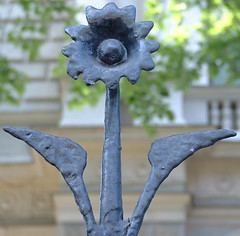From the L.A. Times: A new film about a troupe of disabled performers delivers a message of empowerment.
As I read the first paragraphs of the story, I dreaded that the director, Liu Xiao Cheng, was using disadvantaged people for his personal gain. But, as I read further, it seems he genuinely wants to change how people think about abilities.
"It wasn't enough for this troupe to arouse people's mercies," he said. "We wanted their respect."As I reread the article, it is the columnist's use of language that triggers feelings of bias, "blind dancers," "deaf dancers," "blind singers." By saying, "blind dancer" he focuses on the disability, rather than the person. By removing "hearing-impaired" from "host" in the following paragraph, the theme can sing:
At each performance, a host uses sign language to express the troupe's theme -- that it does not take sight or hearing or full physical faculties to produce gorgeous art.Beautiful.
